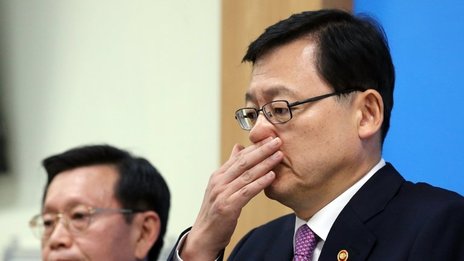South Korea has decided to suspend operations at two more nuclear reactors over the use of unauthorized parts.
The Nuclear Safety and Security Commission also delayed the start of operations at two other reactors, but said there was no public safety threat.
Two reactors were suspended in late 2012, amid a scandal over parts with fake safety certificates.
South Korea has 23 nuclear reactors which supply about a third of its electricity needs.
The suspension of two reactors raised questions about power supply over the summer, local media said.
The two reactors to be suspended pending replacement of the unauthorized parts are the Shin Kori Reactor 2 and Shin Wolsong Reactor 1, the commission said.

South Korea has suspended operations at two more nuclear reactors over the use of unauthorized parts
Shin Kori Reactor 1, which is currently undergoing maintenance, and Shin Wolsong Reactor 2, a new reactor, will also not operate until parts are replaced.
All components used in South Korean nuclear reactors require specific certification.
But last year a minister revealed that some parts used in two reactors at the Yeonggwang nuclear plant had not been properly vetted.
Knowledge Economy Minister Hong Suk-woo said these were “non-core” parts that included fuses, cooling fans and power switches – items which could be used in other industries but needed international certification for nuclear power plant usage.
Earlier this month, six nuclear power engineers and suppliers were jailed in connection with the supply of components with forged safety certificates mainly to the Yeonggwang complex.
[youtube jk7wWtvMAe0]
South Korean experts have not detected any radioactive isotopes from North Korea’s nuclear test, hampering efforts to assess the device.
Eight samples had been analyzed but nothing found, the Nuclear Safety and Security Commission said.
Finding certain isotopes – xenon gases in particular – would help experts determine whether a plutonium or uranium-based device was used.
But a well-contained test could yield no radioactive isotopes, experts say.
South Korean planes and ships were sent out immediately after the test to collect samples, as was a Japanese plane.
“Two days since the North’s nuclear test, the commission has completed analyzing eight samples, but no radioactive isotopes have been discovered as of 15:00 Thursday,” the commission said.
No changes had been recorded at 122 unmanned radiation monitoring systems across the country, it added.
North Korea said on Tuesday that it had carried out an underground nuclear test, which it claimed involved a miniaturized but more powerful device.
Seismic activity triggered by the test at the Punggye-ri site in the north-east of the country was detected by several nations.
The UN Security Council has condemned the test – North Korea’s third, following tests in 2006 and 2009 – and promised action.
Xenon isotopes were detected after the first test but not after the second. Experts say finding it can be a matter of luck and has to be done quickly because it decays rapidly.
North Korea’s first two tests involved plutonium, but it is believed to have a uranium-enrichment programme.
While it has depleted its stocks of “reactor-grade” plutonium needed to make the weapons-grade variety, the country has plentiful reserves of uranium ore.

South Korean experts have not detected any radioactive isotopes from North Korea’s nuclear test, hampering efforts to assess the device
North Korea’s neighbors and the US, meanwhile, are working to coordinate a response to the test.
On Thursday South Korea’s military conducted exercises on both coasts, Yonhap news agency said, while the defence ministry unveiled a missile that it said could hit “precise targets” like “windows of a North Korean command office”.
The National Assembly also adopted a resolution condemning the nuclear test. The two Koreas are still technically at war following the armistice of 1953 that ended armed conflict on the Korean peninsula.
Amid a flurry of diplomatic activity over the issue, US President Barack Obama spoke on the phone with Japanese Prime Minister Shinzo Abe for about 20 minutes, according to Kyodo news agency.
“They pledged to work closely together to seek significant action at the United Nations Security Council and to co-operate on measures aimed at impeding North Korea’s nuclear and ballistic missile programmes,” the White House said in a statement.
The Australian government, meanwhile, has also decided to postpone a visit by North Korean diplomats exploring the possibility of reopening an embassy in the capital, Canberra, this weekend, because of the test.
“We postponed the arrival of North Korean diplomats in Australia as a gesture following this detonation,” Australian Foreign Minister Bob Carr said.
Bob Carr, however, added that there are still plans to re-establish the embassy, saying that “there’s value in having a North Korean diplomatic presence here”.
North Korea closed its embassy there in 2008 due to financial issues.


